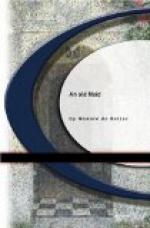One day he appeared in Mademoiselle Armande’s salon with the calf of his leg on the shin-bone. This bankruptcy of the graces was, I do assure you, terrible, and struck all Alencon with horror. The late young man had become an old one; this human being, who, by the breaking-down of his spirit, had passed at once from fifty to ninety years of age, frightened society. Besides, his secret was betrayed; he had waited and watched for Mademoiselle Cormon; he had, like a patient hunter, adjusted his aim for ten whole years, and finally had missed the game! In short, the impotent Republic had won the day from Valiant Chivalry, and that, too, under the Restoration! Form triumphed; mind was vanquished by matter, diplomacy by insurrection. And, O final blow! a mortified grisette revealed the secret of the chevalier’s mornings, and he now passed for a libertine. The liberals cast at his door all the foundlings hitherto attributed to du Bousquier. But the faubourg Saint-Germain of Alencon accepted them proudly: it even said, “That poor chevalier, what else could he do?” The faubourg pitied him, gathered him closer to their circle, and brought back a few rare smiles to his face; but frightful enmity was piled upon the head of du Bousquier. Eleven persons deserted the Cormon salon, and passed to that of the d’Esgrignons.
The old maid’s marriage had a signal effect in defining the two parties in Alencon. The salon d’Esgrignon represented the upper aristocracy (the returning Troisvilles attached themselves to it); the Cormon salon represented, under the clever influence of du Bousquier, that fatal class of opinions which, without being truly liberal or resolutely royalist, gave birth to the 221 on that famous day when the struggle openly began between the most august, grandest, and only true power, royalty, and the most false, most changeful, most oppressive of all powers,—the power called parliamentary, which elective assemblies exercise. The salon du Ronceret, secretly allied to the Cormon salon, was boldly liberal.
The Abbe de Sponde, after his return from Prebaudet, bore many and continual sufferings, which he kept within his breast, saying no word of them to his niece. But to Mademoiselle Armande he opened his heart, admitting that, folly for folly, he would much have preferred the Chevalier de Valois to Monsieur du Bousquier. Never would the dear chevalier have had the bad taste to contradict and oppose a poor old man who had but a few days more to live; du Bousquier had destroyed everything in the good old home. The abbe said, with scanty tears moistening his aged eyes,—
“Mademoiselle, I haven’t even the little grove where I have walked for fifty years. My beloved lindens are all cut down! At the moment of my death the Republic appears to me more than ever under the form of a horrible destruction of the Home.”
“You must pardon your niece,” said the Chevalier de Valois. “Republican ideas are the first error of youth which seeks for liberty; later it finds it the worst of despotisms,—that of an impotent canaille. Your poor niece is punished where she sinned.”




